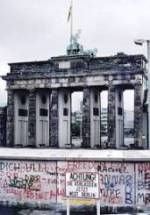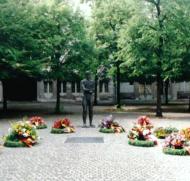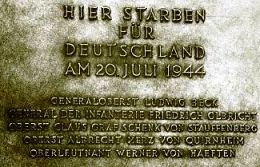![]()
Chapters
References
Conclusion
 Berlin Wall - one of the many tragic consequences of National Socialism  Memorial in the Bendler Block Courtyard for the victims of the July 20th assassination attempt  Memorial plaque in the Bendler Block Courtyard which loosely translated reads "They died for Germany July 20th 1944" followed by the names of Generals Beck and Olbricht, Colonels Stauffenberg and Quirnheim, and Lieutenant Haeften who were the first victims of Nazi reciprocity |
Was Claus von Stauffenberg a traitor to Germany, as many Nazis would claim and continue to do so even after the end of the war? Or instead, was Stauffenberg really a traitor to National Socialism and a hero to Germany? It would be correct to assume that Stauffenberg’s actions on July 20th would more than likely have done nothing to stem the tide against the Allied onslaught against Germany. Some have argued that in light of that information it would have been wiser to wait for the inevitable collapse of the German armies in which case Hitler would have been removed regardless. As far as Stauffenberg was concerned, there was a more pressing need to rid the world of Hitler now rather than later. Since Hitler took office, he had basically burned every political, economic, and social bridge that Germany had to the outside world. If Germany was led to ruin by his hand, the shame and embarrassment of every German who could not or would not voice a concern over Hitler’s atrocities both at home and in the occupied lands would have been magnified thousands of times over. Someone had to step up to restore Germany’s honor before it was too late. Stauffenberg’s early influences on his life coupled with what he witnessed as a member of Hitler’s Germany spurred him to action because Hitler's policies ultimately ran anathema to Stauffenberg’s views of what the nation should be to its citizens. In the end, he was a hero who was definitely not alone in his views. Eight months after July 20th, Hitler was dead and the Third Reich with it. Hard years would follow for Germany as it would be divided into East and West Germany and became the front line for the Cold War. From the end of the Second World War to 1989 Germany as Stauffenberg knew it would not exist. It would take the collapse of the Soviet Union, the same Soviet Union who had raised the Red Banner in victory over the Reichstag in 1945, to allow Germany to become whole again. And by no means would this new Germany be anything reminiscent of what Stauffenberg had in mind for a post Hitler Germany. Indeed, the nation adopted a political system more like his former colleague in the conspiracy, Carl Goerdeler, had envisioned.On the 50th anniversary of the uprising German Chancellor Helmut Kohl, while giving a speech in the courtyard of the old Bendler Block where Stauffenberg met his end, remarked that what the conspirators had done was, “an act of moral self assertion. They had proclaimed to the world that the dignity of each individual human being is more important than any political power and is superior to it. The resistance had united Germans of the most diverse political convictions in a common struggle against the rule of criminality."[34] As Professor Theodore Hammerow would conclude, “Admittedly, most of the members of the resistance, fallible, gullible, sometimes culpable, had at first accepted and served the Third Reich. Then, gradually, almost in spite of themselves, they began to rise above the limitations of their age, their class, and their ideology. They began to see, hesitantly, intermittently, reluctantly, and often dimly, the terrible evil in the Nazi Regime. And having seen it, they eventually decided to oppose it."[35] Stauffenberg
realized that no matter what Germany’s situation any would be
preferable without Hitler than with him. His character and
sense of duty to the nation, not the leader, he loved and served
compelled him to act. His was not one of political ambition or
even rule but it was instead a sincere affection for the place
he called home. Ultimately, he would prove this by giving his
life fighting a tyrant and his barbaric lust for war, death,
pain and suffering. Posterity can hardly ask for more from
those it labels heroes.
Home
To References Public History at the University of North Carolina at Charlotte
|
